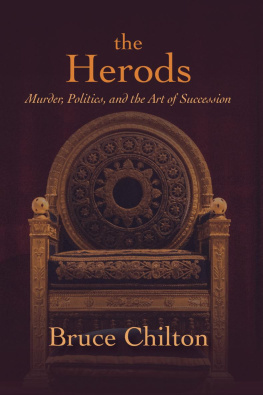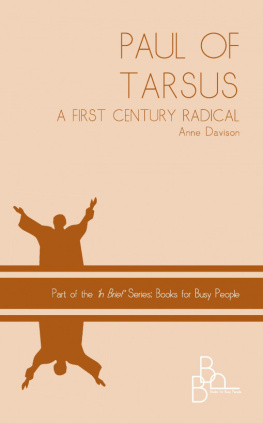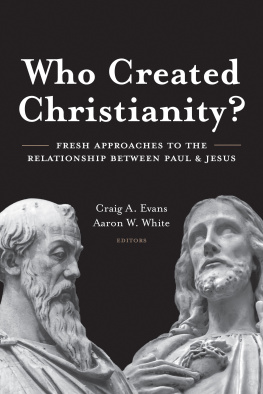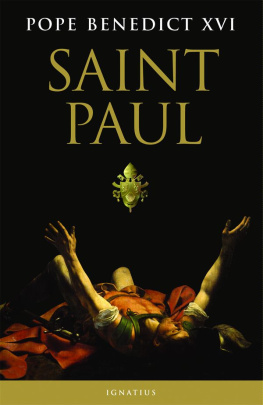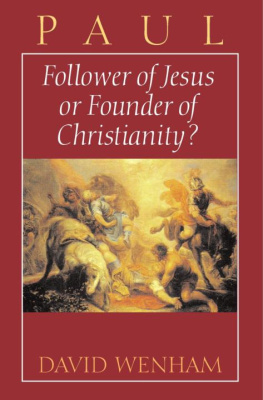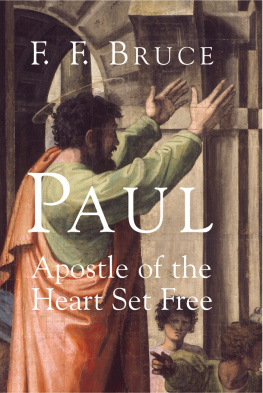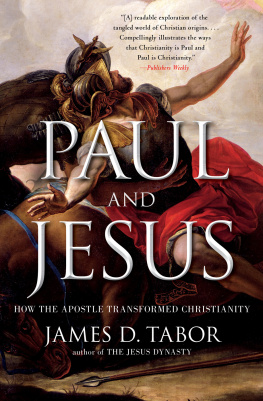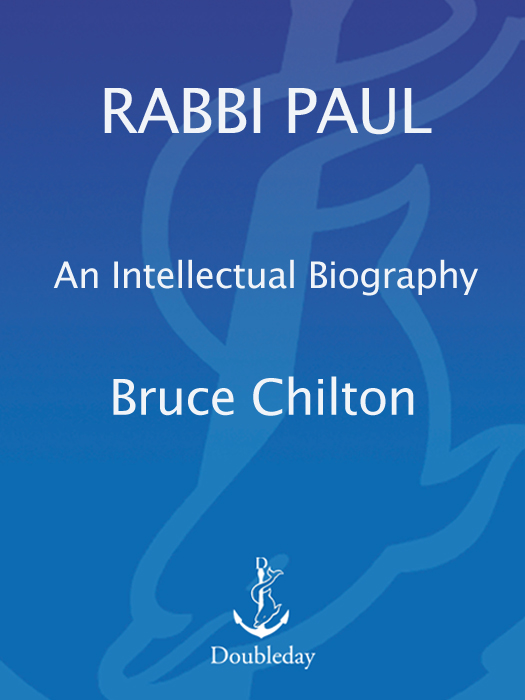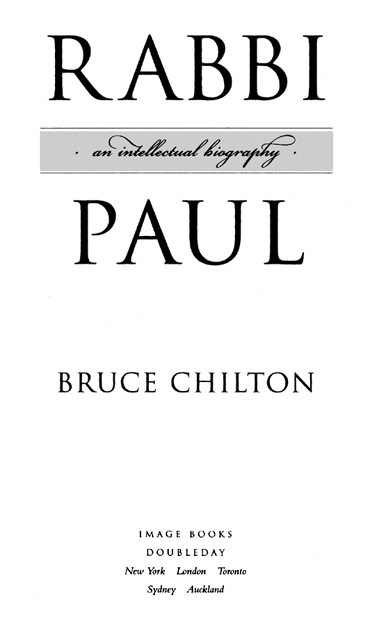
AN IMAGE BOOK
PUBLISHED BY DOUBLEDAY
a division of Random House, Inc.
IMAGE, DOUBLEDAY , and the portrayal of a deer drinking from a stream are
registered trademarks of Random House, Inc.
A Peekamoose Book
The Library of Congress has cataloged the hardcover edition as follows:
Chilton, Bruce.
Rabbi Paul : an intellectual biography / Bruce Chilton.
p. cm.
Includes bibliographical references
1. Paul, the Apostle, Saint. 2. Christian saintsTurkeyTarsusBiography. 3. Tarsus (Turkey)Biography. I. Title.
BS 2506.3. C 47 2004
225.92dc22
[ B ] 2003070121
eISBN: 978-0-307-55105-4
Copyright 2004 by Bruce Chilton
All Rights Reserved
v3.1
for the members of the
Institute of Advanced Theology
CONTENTS
PART ONE
PATH OF VISION
PART TWO
THE CONTENDER
PART THREE
THE APOSTLE OF CHRISTIANITY
MAPS AND ILLUSTRATIONS
PREFACE
Paul has been reviled and revered throughout Western history. A visionary thinker who combined Stoicism, Judaism, and nascent Christian theology, he transformed all of them in the mix. Any single designation we choose for him proves incomplete. He is one of the most frustrating and tantalizing figures in our intellectual tradition because he tried to change every group he joined, every idea he embraced. He wove his thoughts from his complex background and his volatile temperament and produced a new way of thinking and feeling about what it means to be human. He emerged as an innovator and a radical ideologue by synthesizing the popular philosophy of the Greco-Roman world and his passionate Judaism into a new hybrid.
The first Christian dogmatiststhe fathers of the Churchconsidered Paul their premier theologian and referred to him simply as the Apostle. To this day he is widely considered responsible for separating Christianity from Judaism by teaching that God does not require people to obey him, but only to love him and believe in him. Paul made Jesus the center of a new religion, the Christ who offered a special relationship with God despite any human fault or failing. That established him as the principal architect of the Church, the thinker who gave Christianity its doctrine and form.
Pauls influence over the Church has actually grown with time. The Protestant Reformation pinned its hopes for a comprehensive program of reform on Paul and made him the only theologically correct thinker. For all the vehemence of its stand against Protestantism, Roman Catholic Christianity since the Second Vatican Council has increasingly emphasized Pauls teaching that Gods favor cannot be earned by obedience to convention, and Orthodox Christianity has always venerated the Apostle.
Meanwhile, revisionist theologians and criticsancient and modernhave pilloried Paul, making him responsible for whatever is wrong with Christianity. They have portrayed Paul as antifeminist, homophobic, and doctrinairewhile Fundamentalist Christians often embrace such attitudes as part of their Pauline inheritance. Pauls own letters do give support to this picture. He wrote that women in Corinth should shut up in church, he despised homosexuality and prostitution, and he fussed endlessly in an effort to get the churches he addressed in his letters to behave decently and think coherently.
All these images of Paul have their merits, but they inevitably distort the Apostle because they dont fully trace the sources of his ideas, explain why he combined them the way he did, or account for how he changed, often chameleon-like, to impress his vision on the different communities that he proselytized. They do not convey the passion of a man who lived his ideas. It is my hope in presenting an intellectual biography of Paul, and placing his thought within the environment of the Mediterranean world, that we will begin to see who Paul was and understand the thinker who has given us so much of what is most beautiful and most troublesome in Christian faith.
ends with Pauls famous conversion on the road to Damascus, but, as we shall see, this was a Jewish experience. We disentangle Pauls conversion from the fallacy that Paul deliberately separated himself from Judaism: Paul saw himself as one in a long line of Israels visionary prophets.
In , we see Paul debating the significance of Jesus Resurrection with other Jewish leaders in the fledgling Christian movement and crafting his teaching about Jesus for the different communities of Christians in the Mediterranean world. Christianity in the Mediterranean basin varied enormously from city to city, congregation to congregation. But in setting after setting, a single, radical theme reverberates in what Paul, as a rabbi, taught: The chosen people, Israel, are defined, not by kinship and not by obedience to the Torah, but by their belief that the risen Jesus, the Christ, is the Son of God. That view, passionately embraced and fiercely argued, put Paul at odds not only with most other rabbis of his time, but also with those who were apostles before him: Peter, James (the brother of Jesus), and Barnabas.
We will see how Paul played a crucial role in the division that later occurred between Christianity and Judaism, religions often described as having parted ways, each going off in its own direction. But the relationship between them is much more fraught than a parting. It is more like a divorce, in which the partners keep returning to common experiences and affections that are no less potent for having soured. Following Rabbi Pauls journey permits us to trace the roots of the rancor and regret that emerged when Judaism and Christianity became separate, antagonistic religionsand I hope this biography will help readers ford the gulf that separates the two faiths.
worshiping one God challenged every Christian constituency he addressed, whether they were converted pagans or practicing Pharisees. He had to admit that some people refused to call him an apostle (1 Corinthians 9:2). Even in his own eyes, he was (1 Corinthians 15:9) the least of the apostles, who is not worthy to be called an apostle, for the reason that I persecuted the church of God.
Still, we will see that Pauls perspective, controversial as it was, shaped the formation of the New Testament after his death, and we inherit that influence today. Perhaps more than any other single person, Paul defined Christian spirituality. We will examine how he has left his imprint on the way all ChristiansCatholic, Orthodox, and Protestantunderstand the basics of their faith: Spirit, revelation, faith in Jesus as Gods son, conscience, sexuality, what defines religion as an institution, and the nature of the religious personality. The Church has grappled with Pauls thought for two millennia and will probably continue to struggle with it in centuries to come.
H OW CAN WE GET at the truth about Paul as a human being and appreciate his thought? It takes more to encounter Paul than reading an ancient text or two. The New Testament gives us Pauls life and thought in fragments, sometimes through secondhand sources. His letters are the earliest documents in the New Testament, when they are genuine. But some are spurious, and one of the most important of the authentic letters (2 Corinthians) is pasted together from separate pieces of correspondence. Even when we have whole and genuine letters, we are in the position of an eavesdropper who can hear only one side of a conversation, since we dont have letters written back to Paul. We need to parse his words to access the person speaking, and we have to appreciate the settings and milieus that he addressed. We can do that by examining the historical and archaeological evidence of the cities and towns in which Paul taught.


